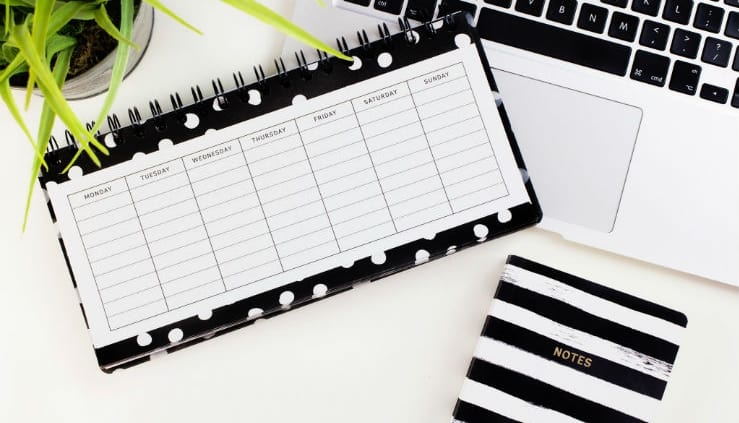One of the first things that you want to do when learning Italian is to learn how to say the days of the week.
How to use Days of the Week in Italian?
The Days of the week in Italian can be used to express a lot of things: for example to give an appointment, say the date or say what day you will arrive to Italy. Also, there are a lot of Common Saying in Italian with Days of the week, such as Mancare un venerdì or Essere sempre in mezzo come il giovedì.
And more!
Let’s see below how to pronounce the days of the week in Italian.
If you want to improve your Itallian Vocabulary, I also suggest to you these books:
I giorni della settimana – the days of the week
| Days in Italian | Pronunciation | Days in English |
| lunedì | looh-neh-dee | Monday |
| martedì | mahr-teh-dee | Tuesday |
| mercoledì | mehr-koh-leh-dee | Wednesday |
| giovedì | joh-veh-dee | Thursday |
| venerdì | veh-nehr-dee | Friday |
| sabato | sah-bah-toh | Saturday |
| domenica | doh-meh-nee-kah | Sunday |
As you can see from the chart, the days of the week in Italian:
- start from Monday,
- are not capitalized,
- are accented on the last vowel – with the exception of sabato and domenica
What is the most effective way to remember the weekdays in Italian?

It may help to use an Italian calendar or agenda.
Every day when you wake up ask yourself che giorno è oggi?
Che giorno è oggi? Oggi è lunedì.
What day is today? Today is Monday.
As you can see Italians don’t use the preposition (on) in front of the day. Just say the name of day.
NOTE: If you want to say that something is happening on a weekly basis then you can use the preposition di or the definite article (il, la, i, le) before the day.
If you want to know more about definite articles read “Italian Definite Articles Chart: An Easy Guide“.
Examples:
faccio yoga di lunedì = faccio yoga il lunedì
I do yoga on Mondays
There is no difference in translation between the two.
You can also say:
faccio yoga tutti i lunedì.
I do yoga all the Mondays.
faccio yoga ogni lunedì.
I do yoga every Monday.
Italians use the definite article in front of the days of the week when it is used as the subject of the sentence.
Examples:
Il sabato è noioso.
Saturday is boring.
I lunedì sono sempre difficili.
Mondays are always hard.
You might also find useful the following related vocabulary:
- Il giorno – the day
- La settimana – the week
- Il fine settimana or il weekend – the weekend
Note: the weekend in Italy is composed of Saturday and Sunday. The only non working day is usually Sunday. Most of the schools are open on Saturdays. - Oggi – today
- Ieri – yesterday
- Domani – tomorrow
- L’altro ieri – the day before yesterday
- Dopodomani – the day after tomorrow
- Ogni giorno / tutti i giorni – every day
- La settimana prossima – next week
- La settimana scorsa/passata – last week
- Che giorno è oggi? – What day is today?
- Che giorno era ieri? – What day was yesterday?
- Che giorno è domani? – What day is tomorrow?
- Oggi è … – Today is ….
- Ieri era … – Yesterday was …
- Domani è … – Tomorrow is …
- Giorno feriale – working day
- Giorno festivo – non working day
- Da … a – from … to
Examples:
Il fine settimana esco con gli amici.
On the weekend I go out with friends.
Bevo il caffè ogni giorno.
I drink coffee every day.
La domenica è un giorno festivo.
Sunday is a non working day.
Lavoro dal lunedì al venerdì.
I work from Monday to Friday.
Ieri era domenica, oggi è lunedì e domani è martedì.
Yesterday was Sunday, today is Monday and tomorrow is Tuesday.
Ci vediamo martedì prossimo!
See you next Tuesday!
Common sayings with the days of the week in Italian

There are some curious expressions and common sayings with the days of the week in Italian:
- Mancare un venerdì.
To be missing a Friday.
It is used in referring to an extravagant, crazy person. - Essere sempre in mezzo come il giovedì.
To be always in the middle like Thursdays.
Since in Italian the week begins on Monday, Thursday is in the middle of the week. It is used to say that someone is always around. - Né di venere né di marte ci si sposa né si parte.
Neither on Venus (Friday) or on Mars (Tuesday) one can get married or leave.
It is better to not start anything new on Tuesdays and Fridays.
In Italy Friday is considered an unfortunate day, especially Friday the 17th! - La febbre del sabato sera.
Saturday night fever. - Se piove di venerdì, piove sabato, domenica e lunedì.
If it rains on Friday it will rain on Saturday, on Sunday and Monday. - Se la domenica piove prima della messa, la settimana è in tresca.
If on Sunday it rains before the mass, the week is in affairs.
Italian Festive Days
Here are listed some of the Italian festive days, mostly from the catholic tradition:
- Lunedì dell’Angelo – Monday of the Angel
The day after Pasqua (Easter), also called lunedì di Pasquetta. - Martedì grasso – Mardi gras
- Mercoledì delle ceneri – Ash Wednesday
- Giovedì Santo – Holy Thursday
The Thursday before Easter. - Venerdì Santo – Holy Friday
The Friday before Easter. - Sabato Santo – Holy Saturday
The Saturday before Easter. - La settimana santa – Holy week
The week of Easter.
Italian Days Abbreviations

You will probably see the Italian days abbreviated on calendars or sometimes when texting with Italians.
The days of the week in Italian are shortened as follows:
lunedì = lun. (or L)
martedì = mar. (or Ma)
mercoledì = mer. (or Me)
giovedì = gio. (or G)
venerdì = ven. (or V)
sabato = sab. (or S)
domenica = do. (or D)
Quick Overview
The days of the week in Italian:
- start from Monday,
- are not capitalized,
- are accented on the last vowel – with the exception of sabato and domenica,
- are not preceded by a preposition – unless there is the meaning of ‘’every’’
- Are preceded by the preposition di or the definite article il, i or la, le in order to say ‘’every’’
- Are preceded by the definite article if used as a subject.
Curiosity about the origin of the names of days in Italian
- The name settimana (week) come from the number sette (seven) because the days of the week are seven.
- The names of the days of the week in Italian come from Latin.
- Latins used to name days after the planets, with the exception of domenica which comes from ‘’Dominus’’ (Lord).
- The final part of the word dì comes from dies which means day.
- That’s why you could hear from Italians buondì instead of buongiorno to say good Morning, literally good day.
- Monday in Italian is lunedì which means giorno della Luna (day of the Moon).
- Tuesday in Italian is martedì which means giorno di Marte (day of Mars).
- Wednesday in Italian is mercoledì which means giorno di Mercurio (day of Mercury).
- Thursday in Italian is giovedì which means giorno di Giove (day of Jupiter).
- Friday in Italian is venerdì which means giorno di Venere (day of Venus).
- Saturday in Italian is sabato which means giorno di Saturno (day of Saturn).
- Sunday in Italian is domenica which means giorno del Signore (day of the Lord).
To know the origin of the days of the week in Italian may actually help you to remember them more easily.



